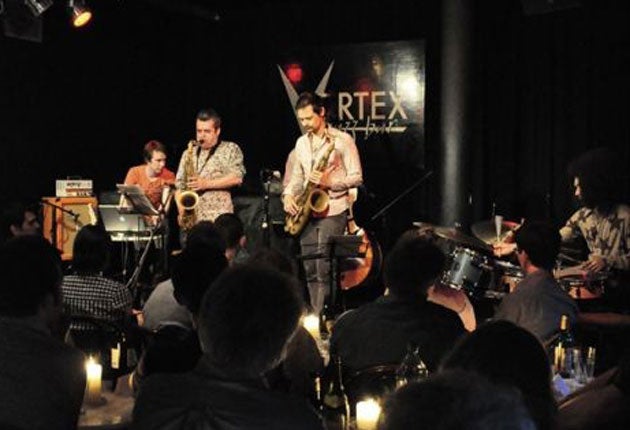Polar Bear, The Vortex, London

In the six years since their second album, Held On The Tips Of Fingers, was nominated for the Mercury Prize, Polar Bear have become an institution on the UK jazz scene, without sacrificing one shred of the inquisitive spirit that brought them to widespread attention.
That is nowhere better illustrated than in the way the electronics operator Leafcutter John is incorporated, his deflating-balloon squeaks intertwining with the gently fluting saxes of Pete Wareham and Mark Lockheart in "Tom Loves Alice Loves Tom". John's manipulation of a balloon's neck produces a sound akin to sax overblowing while the saxes themselves low with the mournful, considered calm of a New Orleans funeral band en route to the grave. Wareham's solo is heartbreakingly beautiful, before Lockheart essays funkier, staccato lines over the shuffle laid down by the bassist Tom Herbert and drummer Seb Rochford.
Rochford is seen as perhaps the most gifted jazz drummer of his generation. His rhythms seem to contain hints of polka, cumbia and rumba, blended into a flow that shifts subtly. There is something mesmeric about the way his eyes peek out from beneath an electric-shock mane of hair, gazing raptly at the ceiling while his sticks dart antically about his kit.
Rochford manages to drive the music along without seeming to push things too hard and his lightness of touch is reflected in sensitive responses. There is no sense of combat or rivalry in the work of Wareham and Lockheart and even the noises from John's battery of handheld electronic devices – at times he appears to be playing Wii ping-pong on his laptop, eliciting weird clicks, boings and scrapes with a nimble backhand – never seem at odds with the kindly spirit of the music. At various times John gestures perplexedly at the mixing desk, shrugging his shoulders as if the sounds he is producing are not his fault, honestly.
His guitar technique, meanwhile, using chopsticks between the strings and playing with what appears to be a paintbrush, surely owes more to the likes of Keith Rowe and Derek Bailey than Eric Clapton. But when all the band's elements are acting in concert, as in the vaguely Ethiopian-sounding groove with which they open the second set, there is a wry magic to Polar Bear's music that is hard to find anywhere else.
Join our commenting forum
Join thought-provoking conversations, follow other Independent readers and see their replies
Comments
Bookmark popover
Removed from bookmarks